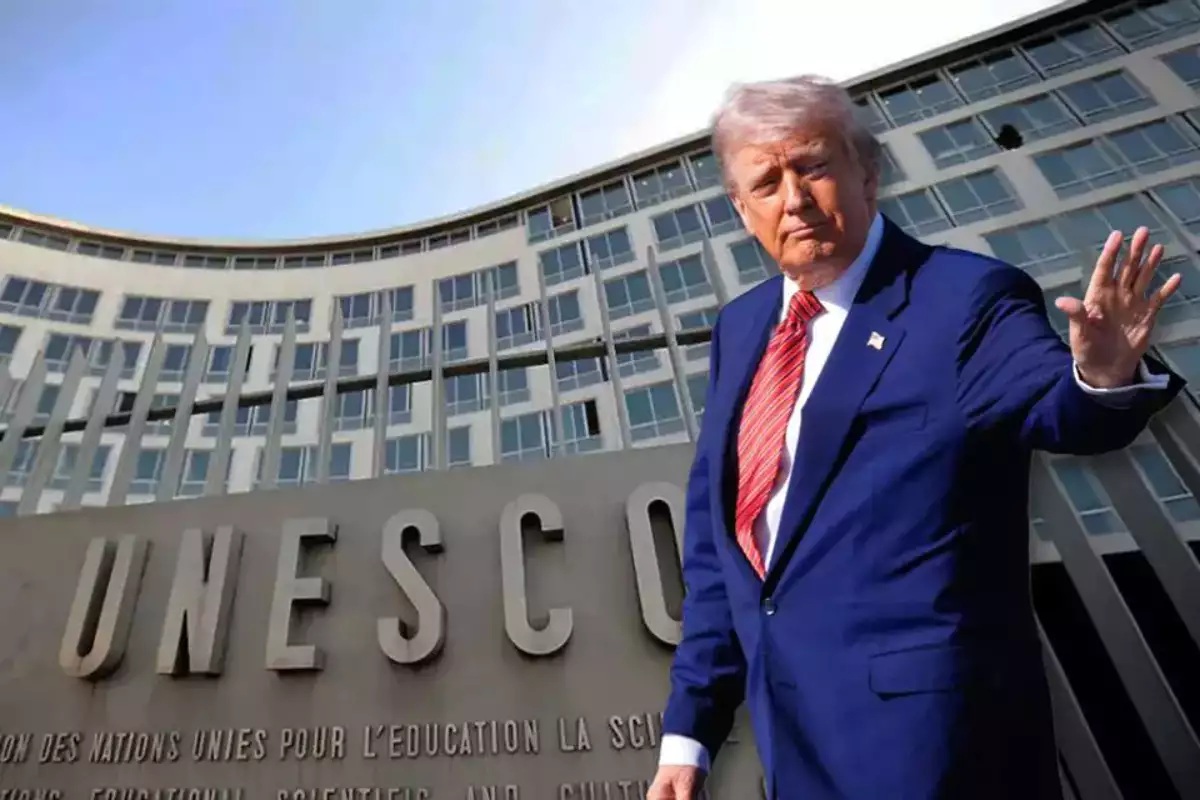As part of his second-term agenda, President Trump, according to media reports of Tuesday, has chosen to scale back U.S. involvement in various international organizations.
This includes a decision to withdraw from the United Nations Educational, Scientific and Cultural Organization (UNESCO) by December 2026.
The move aligns with earlier actions such as halting financial support for the UN’s Palestinian relief agency (Unrwa), pulling out of the World Health Organization (WHO), and leaving the UN Human Rights Council.
The administration has framed these steps as part of a broader reassessment of U.S. participation in global institutions.
The departure from UNESCO will certainly impact the organization.
On the other hand, its financial consequences may be less severe compared to similar U.S. exits from agencies like the WHO, where Washington has historically played a much more dominant funding role.
Currently, the U.S. contributes around 8% of UNESCO’s overall budget.
Officials at UNESCO’s Paris headquarters had been preparing for this possibility, especially given Trump’s prior history with the organization.
White House Deputy Press Secretary Anna Kelly stated that the president’s decision reflects opposition to what she described as UNESCO’s “woke, divisive cultural and social causes.”
This, she claimed are misaligned with the values American voters endorsed in the last election.
Back in February, the administration had announced a 90-day review of U.S. membership in UNESCO.
The review cited the organization’s inability to implement reforms, a persistent anti-Israel stance, and unresolved issues regarding significant outstanding payments owed by the U.S. to the agency.
UNESCO is widely recognized for its efforts to protect cultural and historical heritage around the world, such as granting World Heritage status to iconic landmarks like the Grand Canyon and the ancient ruins of Palmyra.
It also leads global programs focused on education, cultural preservation, and promoting intercultural understanding.
The United States has a long and complicated history with UNESCO.
A founding member since 1945, the U.S. has previously left the organization twice.
The first withdrawal occurred in 1983 under President Ronald Reagan, who criticized the body for harboring anti-Western biases and for what his administration saw as excessive politicization.
The U.S. rejoined under President George W. Bush in 2003, citing satisfaction with reforms implemented at the time.
During his first term, Trump withdrew the U.S. from UNESCO in 2017, repeating concerns about unpaid financial obligations and alleged bias against Israel.
However, under President Joe Biden, the U.S. re-entered the organization in 2023.
The Biden administration viewed rejoining as a strategic necessity to counter growing Chinese influence.
This happened as China had emerged as UNESCO’s largest financial contributor in the absence of U.S. support.
As a condition of rejoining, the U.S. pledged to pay approximately $619 million in back dues and fund initiatives focused on Holocaust education, press freedom, and educational access in Africa.
Tensions between UNESCO and the U.S. have been ongoing since 2011, when the agency voted to admit Palestine as a full member.
This decision led to a halt in U.S. contributions during the Obama administration, which resulted in the accumulation of significant arrears.
UNESCO’s Director-General, Audrey Azoulay, expressed disappointment but not surprise at the Trump administration’s latest decision.
She emphasized that the justification given by the White House mirrors arguments made during Trump’s first term, which she disputes.
Azoulay defended UNESCO’s work, particularly in Holocaust education and combating antisemitism, and asserted that recent reforms have strengthened the organization.
Azoulay also highlighted that UNESCO has diversified its funding sources and implemented structural changes that have helped mitigate the impact of reduced U.S. financial support.
Despite the looming withdrawal, she affirmed that there are no immediate plans for job cuts, suggesting that the agency is prepared to adapt to the change.
In sum, the U.S. decision to exit UNESCO reflects broader geopolitical tensions and longstanding disputes over the organization’s policies and priorities.
While the impact will be felt, UNESCO’s leadership appears resolute in continuing its mission without U.S. backing.







